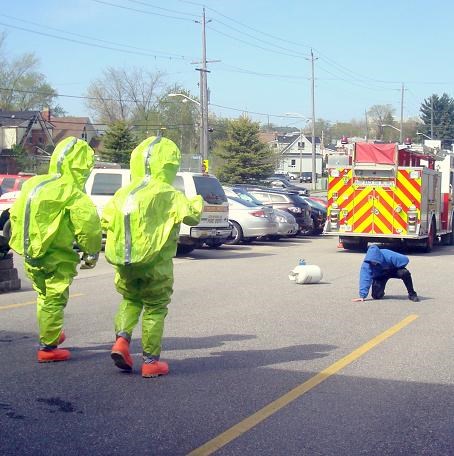Are you prepared is the question Deputy Fire Chief Brian Hunt asked Monday as Emergency Services personnel gathered to kick off Emergency Preparedness Week.
Are you prepared is the question Deputy Fire Chief Brian Hunt asked Monday as Emergency Services personnel gathered to kick off Emergency Preparedness Week.
Fire Station One was the location for this year's launch as as the level two hazardous materials decontamination crew assisted by front line emergency workers demonstrated step by step how they'd handle a hazardous materials accident.
Monday's scenario saw a drug dealer who was making methamphetamine in a homemade lab come in contact with anhydrous ammonia, a key ingredient used in the production of meth.
“The message that we want to have is that we are prepared to react to any hazardous material situation that may come our way,” explains Deputy Fire Chief Brian Hunt, representing the Community Emergency Management Program Committee.
“Our guys are level two operations where in a hazardous material incident such as this we can dam, dyke and contain, and basically our primary function is to stabilize the incident and provide for decontamination.”
With a number of changes to what firefighters can come up against when called to a scene, like meth labs, Hunt says North Bay Fire and Emergency Services personnel have to train for all case scenarios. He says they study and train on an ongoing base and stage one major exercise each year.
“It's changing out there obviously there are things out there that are happening that we need to be made aware of, and how do we cope with that type of a situation when that type of a situation comes along.”
But Hunt says the number one message of the day is residents also need to plan and prepare for any given emergency situation.
Emergency Services personnel will be on hand at Northgate Shopping Centre in the Sears Court both Friday and Saturday handing out information and answering questions.
******
The Emergency Survival Kit Checklist below outlines the basic items every individual should have:
Flashlight and batteries
Radio and batteries or crank radio
Spare batteries (for radio and flashlight)
First-aid kit
Telephone that can work during a power disruption
Candles and matches/lighter
Extra car keys and cash
Important papers (identification)
Non-perishable food (ready-to-eat items that do not require refrigeration)
Manual can opener
Bottled water (4 litres per person per day)
Clothing and footwear
Blankets or sleeping bag
Toilet paper and other personal items
Medication
Backpack/duffle bag
Whistle (to attract attention, if needed)
Playing cards
Since emergency supply requirements vary for individuals with special needs and different disabilities, please refer to the www.emergencymanagementontario.ca website for more details. Also remember that families with babies and toddlers will have additional needs. Remember to include things like diapers, baby food and formula, bottles/sippy cups, toys, crayons and paper etc.
Other tips:
Keep important phone numbers in your emergency kit.
Make sure all members of the household know where the emergency kit is stored.
Discuss your emergency plan with family members in advance of any potential emergency, in the event you aren’t all together when the emergency occurs.
Review and replenish your kit on a yearly basis.



